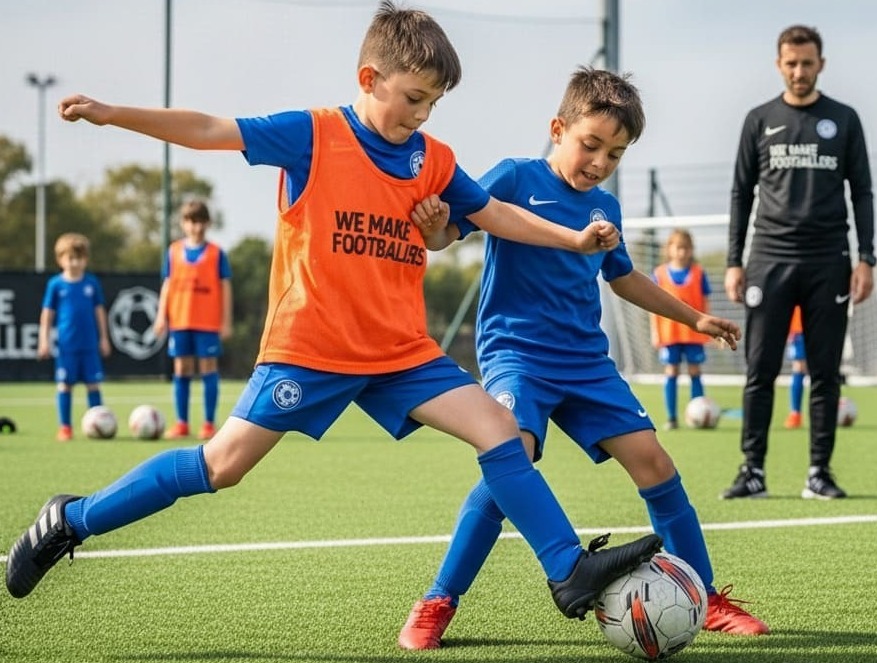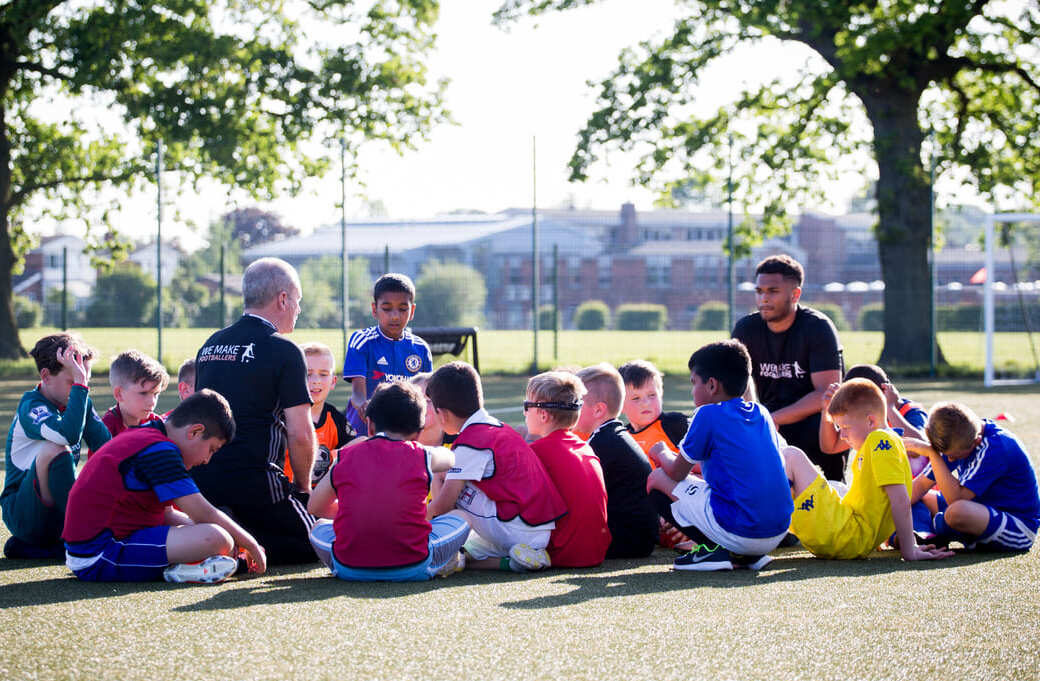The Benefits of Introducing Football to Children Early
How young is too young? It is a question parents grapple with in many different scenarios as their children grow up, from having a mobile phone or tablet to walking to school on their own. When it comes to the beautiful game, there are proven benefits to introducing children to football at an early age.
Some children will be drawn to kicking a ball around from the moment they can walk. Others might be a little inquisitive as to what football is, through seeing it played by others in the park or on television.
For some, their interest in the game will come from football-mad parents who want to inspire the same passion they have for the sport in their children. Generations of the same family all supporting the same team, come rain or shine, is one of the greatest football traditions the world over.
We Make Footballers academies offer weekly football training sessions across the United Kingdom for children of all abilities from 4 to 12 years in a fun, safe environment. The key word in that previous sentence being fun, especially when it comes to the youngest children.
Not only do we aim to start a lifelong love affair with football in the children we coach, but we also know introducing the sport to 4-year-olds teaches lessons and skills which go beyond the one hour a week they spend with our FA qualified coaches at their local We Make Footballers Academy.
From improving physical and mental wellbeing to developing social skills, here are some of the benefits of introducing football to children at an early age.
Football improves physical health and fitness
According to a 2023 study by the University of Bristol, 59 percent of children in the United Kingdom do not meet the national recommended guideline of one hour of moderate to vigorous physical activity every day.
Sadly, this does not come as a surprise. Technology has changed the way children live immeasurably over the past 20 to 30 years; whereas the most effective way for a child to be entertained in the past was by playing, now they have a screen.
Making physical activity fun is therefore vital to ensuring children get the exercise they need. Which is where football comes in.
Running around, kicking and chasing a ball for at least one hour a week at their We Make Footballers training session improves the physical health and fitness of a child.
And it can go beyond that. We Make Footballers coaches encourage children to take the football skills they have been taught at their academy and practice them at home.
By attending We Make Footballers, a child can be inspired to kick a ball around in the garden or at the park three to four times per week. That recommended amount of daily exercise becomes easily achievable.
Giving children a reason to become physically active and getting the exercise they need to remain fit and healthy is one of the biggest benefits of introducing football at a young age.
Football develops gross motor skills
Gross motor skills involve whole body movement using the largest, core muscles of the body. They help with play and socialising by enabling children to walk, run, jump, hang, climb and balance.
The development of gross motor skills is an ongoing process. Different children reach different stages at different times.
One of the benefits of introducing football to children at a young age is that the sport requires enhanced gross motor skills which, once mastered in a footballing context, are transferable into wider life.
Balance is a good example. Ask a young child to stand on one leg and some will not be able to do it. Others will wobble around unsteadily.
In the motion of kicking a football, a child invariably ends up balancing on one leg when the other is drawn back and preparing to strike the ball.
The more a child kicks a football, the better their technique becomes, the more power and precision they get. All those improvements require the enhancement of balance.
This balance developed through weekly football training then brings benefits when it comes to everyday self-care skills, like standing on one leg whilst putting trousers on and getting in and out of a car.
Other gross motor skills which football helps develop include hand-eye coordination, posture and movement.
Late developers may not master all these gross motor skills until beyond the age of 7. If a child begins working on them from the age of 4 through playing football, the benefits are obvious.
Improving social skills and developing new friendships
Introducing football to children at an early age does not just result in physical benefits. At We Make Footballers, we take pride in the role we play bringing children together and forging friendships.
There is no need for young children to try and find common ground – football provides it. And speaking from experience, friendships made through a shared love of football are often amongst the strongest – even between Manchester City and Manchester United, Liverpool and Everton or Newcastle and Sunderland fans.
At a time when funding cuts to youth services and after school clubs are making it increasingly difficult to find organised activities and safe environments where children can socialise outside of school, football coaching academies have never been so important.
Football also helps improve and develop social skills. The sport teaches the value of communication, how to listen successfully to instructions and the importance of teamwork.
A child is never too young to learn that teamwork makes the dream work and cooperation is the best route to a common goal.
So vital to football are teamwork and social skills that one of the FA’s Four Corners is dedicated to them.
The FA Four Corner Model is based on the belief that four key areas – technique, tactical, physical and social - work together in tandem to produce the best players and the most successful teams.
The We Make Footballers syllabus is based upon the Four Corner Model, meaning every child who attends our academies is learning social skills which can help them get on in life as well as football.
Football boosts confidence
Want to know one of the things our coaches say they enjoy most about working for We Make Footballers? The satisfaction that comes with seeing a child master a new skill and the confidence boost it brings.
For children at an early age, football can often be the first activity which has benefits for their confidence and self-esteem outside of a family or education environment.
The boost a child gets from being a part of a winning team speaks for itself. But football also works on an individual level, such as when all the hard work practicing shooting with the weaker foot or learning how to Cruyff Turn pays off for the first time.
Improved confidence soon brings benefits in other areas too. Children become less afraid of making mistakes when they have confidence that they can overcome whatever challenge has been put in front of them with time and practice.
Learning from mistakes is one of the best ways to improve and develop, bringing more success which further boosts confidence. And so, the wheel keeps turning.
Helping instil confidence at an early age through football also makes a child more sociable and happier.
Football coaching for younger children
We Make Footballers are the number one supplier of weekly football coaching sessions for children aged between 4 and 12 in the United Kingdom.
With small groups of no more than 10 children per coach, training is focused and tailored to the needs and ability levels of each individual player. Skills are then mastered through our practice makes permanent ethos in a fun and safe environment led by FA qualified coaches.
No matter what parent or child wants to get out of football, We Make Footballers can help them on their journey. Lifelong friendships are made at our academies, children find their way into local grassroots teams we have partnered with and over 200 graduates of our academies have signed professionally.
To find your nearest academy and sign up for a free first session, please visit the We Make Footballers website.



